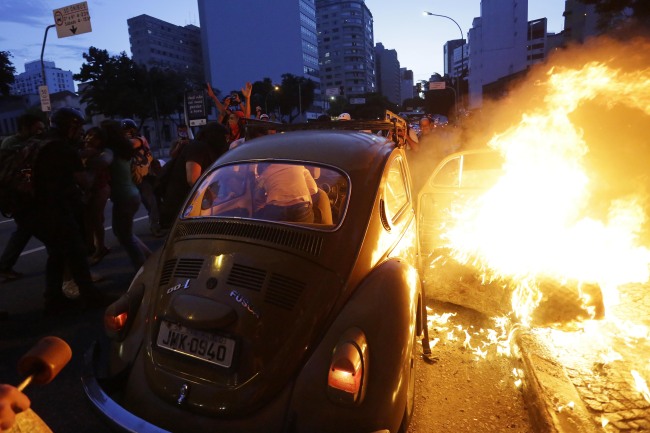 |
상파울로에서 월드컵 반대 시위도중 불에 타고 있는 차량 (AP-Yonhap) |
브라질 주요 도시에서 25일(현지시간) 2014 월드컵 개최에 반대하는 시위가 벌어졌다. 전국 규모로 시위가 일어난 것은 올해 들어 처음이다.
브라질 언론은 상파울루와 리우데자네이루, 브라질리아 등 32개 도시에서 시위 가 발생했다고 전했다.
이날 시위는 페이스북 등 소셜네트워크서비스(SNS)를 통해 자발적으로 조직됐으 며, '블랙 블록스'(Black Blocs)라는 과격 단체가 개입된 것으로 알려졌다.
이날로 시 탄생 460주년을 맞은 상파울루에서는 중심가인 파울리스타 대로를 비 롯한 곳곳에서 수백 명씩 산발적으로 시위를 벌였다. 시위에는 최소한 2만4천여 명 이 참가한 것으로 알려졌다.
시위대는 "누구를 위한 월드컵인가?" "우리에게는 월드컵이 필요 없다"는 등의 내용이 적힌 플래카드를 들고 거리행진을 했다.
복면을 쓴 일부 시위대는 공공시설물을 훼손하고 은행과 상점 등에 돌을 던져 유리창을 깨뜨리는가 하면 쓰레기 더미에 불을 붙이기도 했다.
경찰은 최루탄을 쏘며 진압에 나섰고, 시위대와 곳곳에서 충돌한 끝에 수십 명 을 연행했다.
SNS에는 2014 월드컵 예산이 초기 추정치보다 285% 늘어나면서 2006년 독일 월 드컵이나 2010년 남아프리카공화국 월드컵 예산을 뛰어넘은 사실을 비난하는 글이 폭주하고 있다.
시위대는 "국민의 이익을 위해 싸우고, 브라질이 더 정의롭고 평등한 나라가 되 기를 바란다는 사실을 알리려는 게 시위의 목적"이라면서 월드컵에 드는 막대한 재 원을 보건, 교육, 치안 확보, 주거환경 개선 등 국민의 삶의 질을 높이는 데 사용해 야 한다고 말했다.
지난 22일에는 북동부 리우 그란데 도 노르테 주의 주도(州都)인 나탈 시에서 노조원과 사회단체 회원들이 '월드컵 반대' 시위를 했다. 시위는 나탈 시 남쪽에 있 는 월드컵 본선 경기장 아레나 다스 두나스(Arena das Dunas) 인근 도로에서 벌어졌 다. 이 경기장에서는 같은 날 준공식 행사가 열렸다.
이어 23일에는 남부 포르토 알레그레 시에서 1천500여 명이 거리를 행진하며 시 위를 벌였다. 복면을 쓴 시위대는 공공시설물과 상점 유리창을 부수고 쓰레기 더미 에 불을 질렀다. 월드컵에 반대하는 폭력시위가 벌어진 것은 올해 들어 처음이다.
지난해 6월 2013년 국제축구연맹(FIFA) 컨페더레이션스컵 대회가 열린 6개 도시 에서는 80여만 명이 시위에 참가했다. 당시 시위는 대중교통요금 인상에 항의하고 부정부패 척결, 공공서비스 개선 등을 요구하며 시작됐으나 나중에는 '월드컵 개최 불가' 구호가 터져 나왔다. (연합)
<관련 영문 기사>
World Cup protests spark violence in Brazil
Demonstrators and police clashed in Sao Paulo on Saturday during the first in a planned series of anti-World Cup protests called by radical activist group Anonymous across Brazil.
With less than five months before the June 12 kick-off -- when the five-time champions and hosts take on Croatia -- Brazil is facing the same kind of social rumblings that marred last year's Confederations Cup dress rehearsal.
Anonymous called for protests against football's fabled event via its Facebook page under the slogan, "The Cup will not take place."
Other activists said "FIFA go home" on Twitter, referring to football's world governing body, which was likely watching the weekend's events with some concern.
Brazilians are avid users of social media, a favored tool to organize protests.
But turnout was modest.
In the country's sprawling industrial and financial hub of Sao Paulo, about 2,000 people demonstrated near the Art Museum and on the key Avenida Paulista, chanting and waving signs like "Wake up Brazil, a teacher is worth more than
(footballer) Neymar."
Demonstrators and police clashed, with protesters burning tires and garbage, and some engaging in vandalism targeting banks and other businesses.
Local media said anarchists had infiltrated the protests, and that 30 people were arrested.
Rio de Janeiro -- where huge demonstrations turned violent in July -- rallied just about 200 to a demonstration on landmark Copacabana Beach.
The capital Brasilia and the central city of Goiania each saw small demonstrations of fewer than 100, local media reported.
Anonymous, which has staged a number of highly publicized stunts in different countries, vowed that the protests planned for 36 cities across Brazil -- a nation of 200 million -- would "be followed by others."
Many in football-mad Brazil say they are not against the World Cup as such
-- their country of 200 million is the most successful nation in the tournament's 84-year history.
But they are outraged to see hundreds of millions of dollars spent on preparing 12 host cities for the sports jamboree when poor infrastructure and areas such as health and education require urgent massive investment.
Brazil has been hit in recent weeks by fresh unrest of a different kind, with "rolezinhos" flash mobs composed primarily of young people from slum areas swooping on shopping malls in swanky districts of Rio and Sao Paulo.
Authorities have slapped bans on the practice in a bid to stamp out the craze.
Meanwhile, the civil aviation authority's chief, Wellington Moreira Franco, complained after an inspection of host cities' airports that contractors were behind on many facility upgrades ahead of the event, particularly Fortaleza airport's expansion. (AFP)






![[Exclusive] Hyundai Mobis eyes closer ties with BYD](http://res.heraldm.com/phpwas/restmb_idxmake.php?idx=644&simg=/content/image/2024/11/25/20241125050044_0.jpg)
![[Herald Interview] 'Trump will use tariffs as first line of defense for American manufacturing'](http://res.heraldm.com/phpwas/restmb_idxmake.php?idx=644&simg=/content/image/2024/11/26/20241126050017_0.jpg)
![[Herald Review] 'Gangnam B-Side' combines social realism with masterful suspense, performance](http://res.heraldm.com/phpwas/restmb_idxmake.php?idx=644&simg=/content/image/2024/11/25/20241125050072_0.jpg)